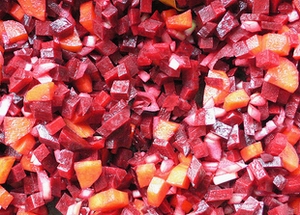New re search from the University of Reading has shown that eating four slices of bread containing beetroot lowers blood pressure and improves the function of blood vessels, significantly improving heart health.
search from the University of Reading has shown that eating four slices of bread containing beetroot lowers blood pressure and improves the function of blood vessels, significantly improving heart health.
The researchers provided 24 participants with four slices (200g) of bread containing 100g of beetroot, or control bread with no beetroot enrichment once on two separate occasions. They found the diastolic blood pressure of those who consumed ‘beetroot bread' was lowered by up to 7 mmHg when compared to the control group approximately 3 hours after consumption.
Evidence suggests that a reduction in diastolic blood pressure of 5-6 mmHg over a five year period could reduce the chances of a stroke by 38% and coronary heart disease by 23% less. In addition, prolonged high blood pressure is an important risk factor for the development of heart disease, which is the single biggest killer in the UK, causing nearly 179, 000 deaths per year.
The component of beetroot bread thought to be responsible for the beneficial effects on blood vessel function and blood pressure is dietary nitrate. Dietary nitrate is a natural component of beetroot and a number of other vegetables such as spinach, lettuce and rocket.
When dietary nitrate is eaten it produces nitric oxide in the blood vessel wall which causes relaxation of the vessel and increased blood flow. This ultimately results in lowering of blood pressure and an improvement in blood vessel function.
Julie Lovegrove, Professor of Human Nutrition, Head of the Hugh Sinclair Unit of Human Nutrition and the Deputy Director of the Institute for Cardiovascular and Metabolic Research (ICMR) at the University of Reading, who led the study said: "These exciting and novel findings show for the first time that bread containing beetroot improves blood vessel function. This is an important addition to the increasing body of evidence that suggests beneficial effects of dietary nitrate rich foods on the heart.”
"This research also supports the findings of our previous study which was carried out last year and showed that beetroot in the form of juice or bread lowers blood pressure. Collectively, these studies suggest a potential role for foods rich in dietary nitrate in the management of high blood pressure."
 search from the University of Reading has shown that eating four slices of bread containing beetroot lowers blood pressure and improves the function of blood vessels, significantly improving heart health.
search from the University of Reading has shown that eating four slices of bread containing beetroot lowers blood pressure and improves the function of blood vessels, significantly improving heart health.The researchers provided 24 participants with four slices (200g) of bread containing 100g of beetroot, or control bread with no beetroot enrichment once on two separate occasions. They found the diastolic blood pressure of those who consumed ‘beetroot bread' was lowered by up to 7 mmHg when compared to the control group approximately 3 hours after consumption.
Evidence suggests that a reduction in diastolic blood pressure of 5-6 mmHg over a five year period could reduce the chances of a stroke by 38% and coronary heart disease by 23% less. In addition, prolonged high blood pressure is an important risk factor for the development of heart disease, which is the single biggest killer in the UK, causing nearly 179, 000 deaths per year.
The component of beetroot bread thought to be responsible for the beneficial effects on blood vessel function and blood pressure is dietary nitrate. Dietary nitrate is a natural component of beetroot and a number of other vegetables such as spinach, lettuce and rocket.
When dietary nitrate is eaten it produces nitric oxide in the blood vessel wall which causes relaxation of the vessel and increased blood flow. This ultimately results in lowering of blood pressure and an improvement in blood vessel function.
Julie Lovegrove, Professor of Human Nutrition, Head of the Hugh Sinclair Unit of Human Nutrition and the Deputy Director of the Institute for Cardiovascular and Metabolic Research (ICMR) at the University of Reading, who led the study said: "These exciting and novel findings show for the first time that bread containing beetroot improves blood vessel function. This is an important addition to the increasing body of evidence that suggests beneficial effects of dietary nitrate rich foods on the heart.”
"This research also supports the findings of our previous study which was carried out last year and showed that beetroot in the form of juice or bread lowers blood pressure. Collectively, these studies suggest a potential role for foods rich in dietary nitrate in the management of high blood pressure."







